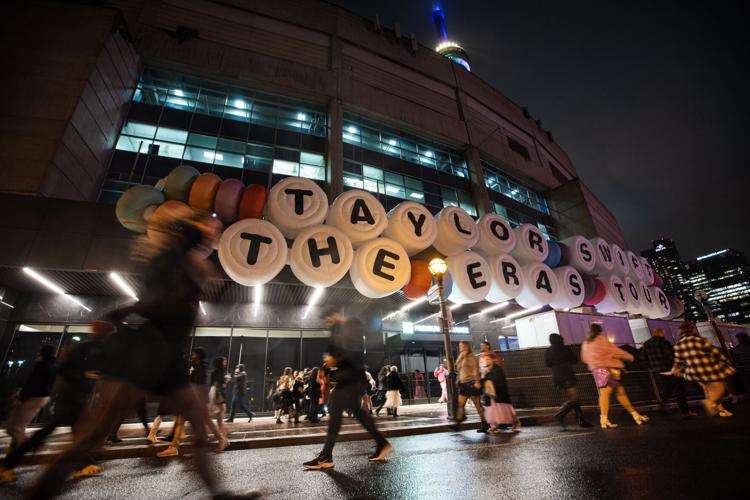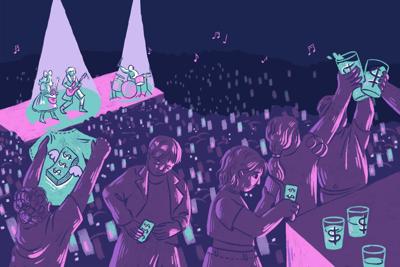Janiece Campbell set her budget at $300.╠²
That seemed like a reasonable price to see Kendrick Lamar at Rogers Centre in Toronto this summer, but Campbell had no idea how much her concert ticket would actually cost. She knew the final value would be determined by the controversial ŌĆ£dynamic pricingŌĆØ model: when prices are jacked up by a sudden rush of fans trying to buy tickets at the same time.
Campbell, 26, logged onto Ticketmaster for the official presale and watched as the lengthy queue dwindled to zero. A few hectic moments later, she clicked ŌĆ£Place OrderŌĆØ for a seat near the back of the lower bowl.╠²
The price for each ticket: $499.50, plus service fees of $156.85. Grand total: $566.60.
ŌĆ£I have no idea how the price skyrocketed,ŌĆØ said Campbell. ŌĆ£Me and my friends are honestly just trying to have a good summer, and we love Kendrick, you know? So we just had to bite the bullet.ŌĆØ
- Emilie Hanskamp Special to the Star
Dynamic pricing. Opaque service fees. Speculative resellers. Long and unreliable queues on Ticketmaster. As ║ŻĮŪ╔ńŪ°╣┘═°emerges as a major destination for some of the worldŌĆÖs most coveted shows, the experience of concertgoing for many local music fans now often feels like navigating the nine circles of hell ŌĆö and paying for the privilege.╠²
As of writing, the cheapest ticket to see BLACKPINK from the very back corner of Rogers Centre in July╠² If you want to see Coldplay this summer at the soon-to-be-built Rogers Stadium,╠²╠²Earlier this week, Lady Gaga announced two ║ŻĮŪ╔ńŪ°╣┘═°concerts, and though tickets haven’t even been released, they’re .
Even tickets to medium-size venues ŌĆō History, Rebel, Danforth Music Hall ŌĆō often go for over $100. Inside, a beer will run you about $15, while a trip to the merch table might cost between $50 to $100. In this red-hot live music industry, artists and a small number of multinational corporations are making record-breaking profit off the backs of music fans, who are increasingly footing the bill.
So how did we get here, and why are so many fans willing to fork over a small fortune for a single night of live music?
Inflation is an obvious but important part of the answer: almost everything costs more than it did before the pandemic.
The costs for touring musicians have ŌĆ£gone up like crazy,ŌĆØ according to Elliott Lefko, a longtime concert promoter and the vice-president of AEG Live, citing an approximate cost increase of 40 per cent on bus rentals, insurance, crew wages and more.
ŌĆ£The promoter and the venues have to raise ticket prices to cover those increases ŌĆō╠² thatŌĆÖs the only way bands can make an income, since they donŌĆÖt make income off records.ŌĆØ Lefko explained. ŌĆ£So a $25 dollar ticket becomes a $40 dollar ticket.ŌĆØ
But thereŌĆÖs also been a market correction, says David Soberman, a marketing professor at the Rotman School of Management at the University of Toronto.╠²
Ticket prices in the past were probably set too low, he says: ŌĆ£The people running live music events have become better at estimating demand, better at setting the prices and optimizing their revenue.ŌĆØ╠²
ŌĆ£If your objective is to sell out three shows at a venue with a capacity of 18,000, you want to sell exactly 54,000 tickets at the maximum price you can,ŌĆØ Soberman said. That means setting tickets at the highest price that fans will pay for.

Taylor Swift fans head home after the first Eras tour concert at The Rogers Centre.
Nick Lachance/║ŻĮŪ╔ńŪ°╣┘═°Star file photoAnd pay they will.╠²
Daniel Tsai, a business and law╠²professor at U of T, explained that concerts have become an important part of the ŌĆ£,ŌĆØ a trend in which consumers are more willing to spend money on concerts and restaurants instead of material goods. This trend was exacerbated, especially among young people, during the pandemic, which created a pent-up demand for live music.
Many millennials and Gen Z, burned by the market, arenŌĆÖt dreaming of ŌĆ£a home with a white picket fence and a two-car garage,ŌĆØ Tsai said. Instead, theyŌĆÖre motivated by a fear of missing out. ŌĆ£People are willing to splurge on what they believe is a once-in-a-lifetime opportunity.ŌĆØ
A key part of the experience economy is global superstars, who, in economic terms, are truly unique commodities: thereŌĆÖs only one Taylor Swift or Jelly Roll and they can only be in one place at a time. That creates a massive gulf between demand and supply, which leads to soaring prices. Beyonc├®’s 2023 Renaissance World Tour grossed nearly $600 million. The Eras Tour, which wrapped up in Vancouver last year, sold $2,077,618,725 in tickets:
In 2018, Jennifer Gosnell spent just $40 to see Taylor Swift at Rogers Centre. In 2024, she was unable to get Eras Tour tickets, despite being a verified fan and having access to multiple pre-sales. Desperate, she turned to GameTime, a third-party reseller, where she bought a single ticket for $1,600 (USD) ŌĆö more than 40 times more than her ticket just six years prior.╠²
ŌĆ£IŌĆÖve never before in my life spent $1,600 to see anything or anyone,ŌĆØ said Gosnell. ŌĆ£But I also didnŌĆÖt see any concerts for two or three years due to the pandemic. Plus, itŌĆÖs the Eras Tour, which is like 10 concerts in one. I justified it to myself that way ŌĆö and honestly, it was worth it.ŌĆØ
The blame game
An economics lesson wonŌĆÖt ease the financial pain for most concert-goers, nor will it offer comfort to fans who feel like the game is rigged.
In recent years, fans have directed their anger at the most obvious target: Live Nation Entertainment, an American-based entertainment juggernaut that formed out of the merger of Live Nation and Ticketmaster.╠²
That 2010 merger paved the way for what many industry experts today describe placed comfortably in the hands of a company that also owns and operates hundreds of venues around the world. (In Toronto, Live Nation Entertainment owns and operates Budweiser Stage, History, the soon-to-be-built Rogers Stadium and several other venues.) Last spring, the U.S. The Department of Justice aimed at breaking up Live Nation Entertainment, alleging that the company ŌĆ£engaged in anticompetitive conduct to cement their dominance of the live concert market and act as the gatekeeper for an entire industry.ŌĆØ
This type of corporate consolidation, says Tsai, creates conditions that allow both artists and Live Nation Entertainment to exploit consumers. ThereŌĆÖs little to stop artists and promoters from charging absurd amounts given the lack of competition at the top of the live music industry, he added: ŌĆ£ItŌĆÖs almost like price fixing.ŌĆØ
Live Nation Entertainment has long pointed out that it has little control over ticket prices. The artist determines the price of a ticket, the company points out, and also takes home the lionŌĆÖs share, often up to 90 per cent, of the profit.
But concert-goers are also paying for additional service fees which, in the case of major acts, can cost over $100.╠²
How these fees are determined and where this revenue goes, Tsai argues, is largely hidden or obscured from buyers. ŌĆ£If Live Nation owns the venue or has exclusive control over the venue ŌĆō which is the case for numerous stadiums and theatres in Toronto, then they can set the fees however they want.ŌĆØ╠²
Wayne Zronik, the president of business operations for Live Nation Entertainment told the Star that the company is open and transparent about how its fee factors into ticket pricing, and that it follows ŌĆ£industry standardsŌĆØ for determining those fees. (Ticketmaster says it makes an ŌĆ£ŌĆØ commission of 5 to 7 percent on the sale of each ticket.)
He rejects the notion that Live Nation Entertainment is responsible for keeping concert prices high. ŌĆ£About three quarters of our concert tickets (in North America) sell for under $100, and our average entry level price is about $40,ŌĆØ he said. ŌĆ£This is by far one of the most affordable experiences in live entertainment broadly.ŌĆØ
Zronik also said that itŌĆÖs a ŌĆ£misnomerŌĆØ to suggest that Live Nation Entertainment controls the major venues in Toronto. The decision to build Rogers Stadium, he explained, ŌĆ£was born out of astronomical demand and the high number of artists out on stadium tours right now.ŌĆØ
ŌĆ£That larger venue will allow us to have a much wider variety of tickets and more supply for fans that want to get in,ŌĆØ he said.╠²
- Richie Assaly
A path forward?
Among experts, there is no clear consensus on how we might reverse the trend or keep major ticket concerts at reasonable a price.
For Tsai, the only way out of this quagmire is for the federal government to introduce regulations to encourage competition, such as breaking up Live Nation Entertainment, or urging Ticketmaster to be more transparent about its fees. He also believes that Ontario and other provinces should introduce legislation that restricts or creates a limit on how much tickets can be resold for on the secondary market. Such legislation already exists in many jurisdictions in Europe, leading to the absurd situation in which some
Soberman disagrees. The government, he argues, is responsible for providing necessities like education and health care but has no business intervening in the market to ensure that all Canadians can access live music. ŌĆ£I’d like to drive around in a Ferrari, but thatŌĆÖs not really something that we as a society have an obligation to provide,ŌĆØ he said.
The market is the market, in other words. The Canadian Charter of Rights and Freedoms, unfortunately, does not mention the right to see a Taylor Swift concert.
In a glimmer of hope, some major acts╠²ŌĆö╠²The Cure, and ╠²ŌĆö have shown a willingness to take a profit cut in order to keep their ticket prices lower. Fan pressure has also pushed major acts, , to forgo the use of dynamic pricing.
Still, Lefko is skeptical that anything will change for big-ticket concerts. A more reasonable solution for music fans, he said, is to spend their money on smaller or lesser-known acts.
ŌĆ£Last winter, (║ŻĮŪ╔ńŪ°╣┘═°indie band) the Weather Station played a career retrospective at the Great Hall for three nights, and they brought in collaborators from all over the world,ŌĆØ he explained. ŌĆ£That was amazing, and so affordable, and youŌĆÖre sitting up close to the stage.
ŌĆ£Go to the Lula Lounge, go to the Garrison, go to the Burdock Music Hall, and keep up with their listings,ŌĆØ Lefko added. ŌĆ£ThatŌĆÖs where thereŌĆÖs a real heartbeat of amazing music to see there.ŌĆØ
As for Campbell, who also spent over $1,300 to see Beyonc├® in Chicago this summer, sheŌĆÖs made her peace.
ŌĆ£Money comes, and money goes,ŌĆØ she says with a laugh. ŌĆ£But memories last forever.ŌĆØ╠²
Clarification - March 31, 2025
The fact box relating to ticket prices was updated to make clear that the╠²facility charge and the majority of the service fee goes towards the venue and only the processing fee, not service fee, goes to Ticketmaster.╠²
╠²


































To join the conversation set a first and last name in your user profile.
Sign in or register for free to join the Conversation